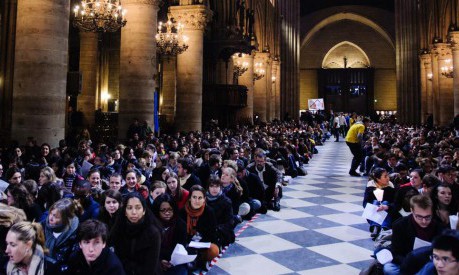When many think about France and religion today, the images that usually come to mind are those of a highly secular society with a growing Islamic presence: a combination of widespread indifferentism, epicurean Voltairans, persistent anti-Semitism, increasingly radicalized Muslims, and now jihadist-inspired and organized terrorism.
But now even some secular French journalists have started writing about a phenomenon that’s become difficult to ignore: an increasingly self-confident Catholicism that combines what might be called a dynamic orthodoxy with a determination to shape French society in ways that contest the status quo—both inside and outside the Church.
On October 30, readers of France’s main center-right newspaper, Le Figaro, woke up to the headline “La révolution silencieuse des catholiques de France.”
What followed was a description of how those whom Le Figaro calls France’s néocatholiques have come to the forefront of the nation’s political, cultural, and economic debates.
Significantly, the new Catholics’ idea of dialogue isn’t about listening to secular intellectuals and responding by nodding sagely and not saying anything that might offend others. Instead, younger observant Catholics have moved beyond—way, way beyond—what was called the “Catholicism of openness” that dominated post-Vatican II French Catholic life.
While the néocatholiques are happy to listen, they also want to debate and even critique reigning secular orthodoxies. For them, discussion isn’t a one-way street. This is a generation of French Catholics who are, as Le Figaro put it, “afraid of nothing.”
A visible—and challenging—presence
Perhaps the most evident sign of this sea-change in French Catholicism is what’s called La Manif pour tous. This movement of hundreds of thousands of French citizens emerged in 2012 to contest changes to France’s marriage laws.
La Manif’smembership traverses France’s deep left-right fracture. It also includes secular-minded people, many Jews, some Muslims, and even a good number of self-described gays. Yet La Manif’s base and leadership primarily consist of lay Catholics.
Though the French legislature passed la loi Taubira legalizing same-sex marriage in 2013, the Socialist government has subsequently trod somewhat more carefully in the realm of social policy. After all, when a movement can put a million-plus people on the streets to protest on a regular basis, French politicians have historical reasons to get nervous. Continue reading
Sources
- The Catholic World Report, from an article by Dr. Samuel Gregg, Research Director at the Acton Institute.
- Image: Le Figaro Premium
News category: Features.




